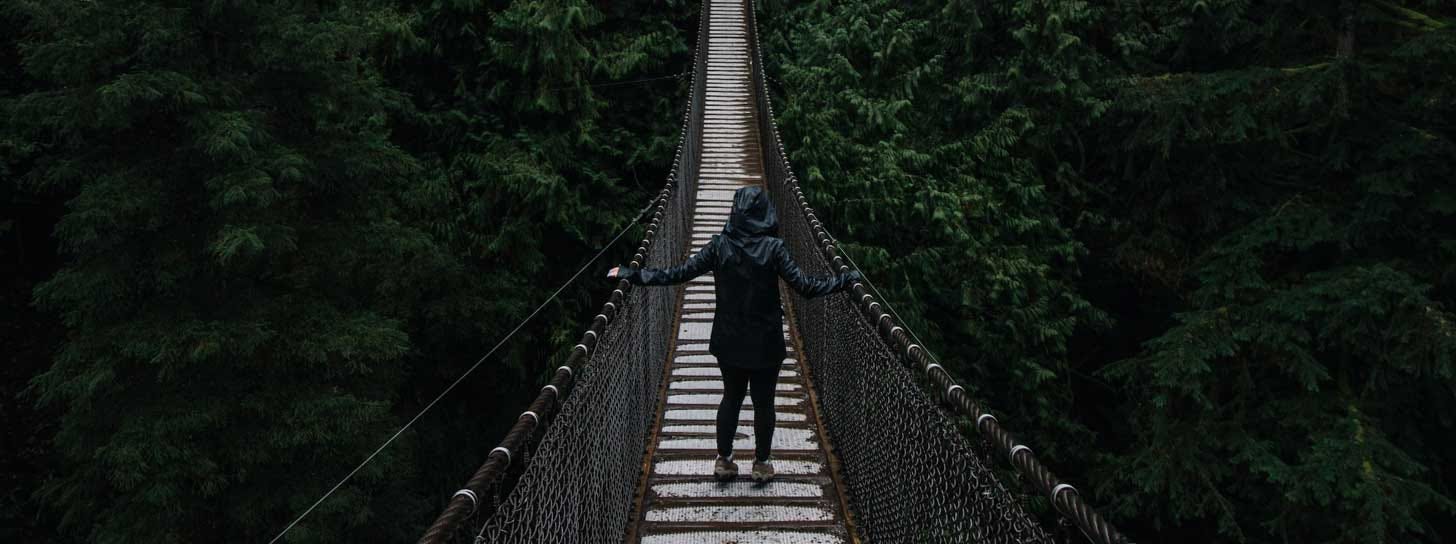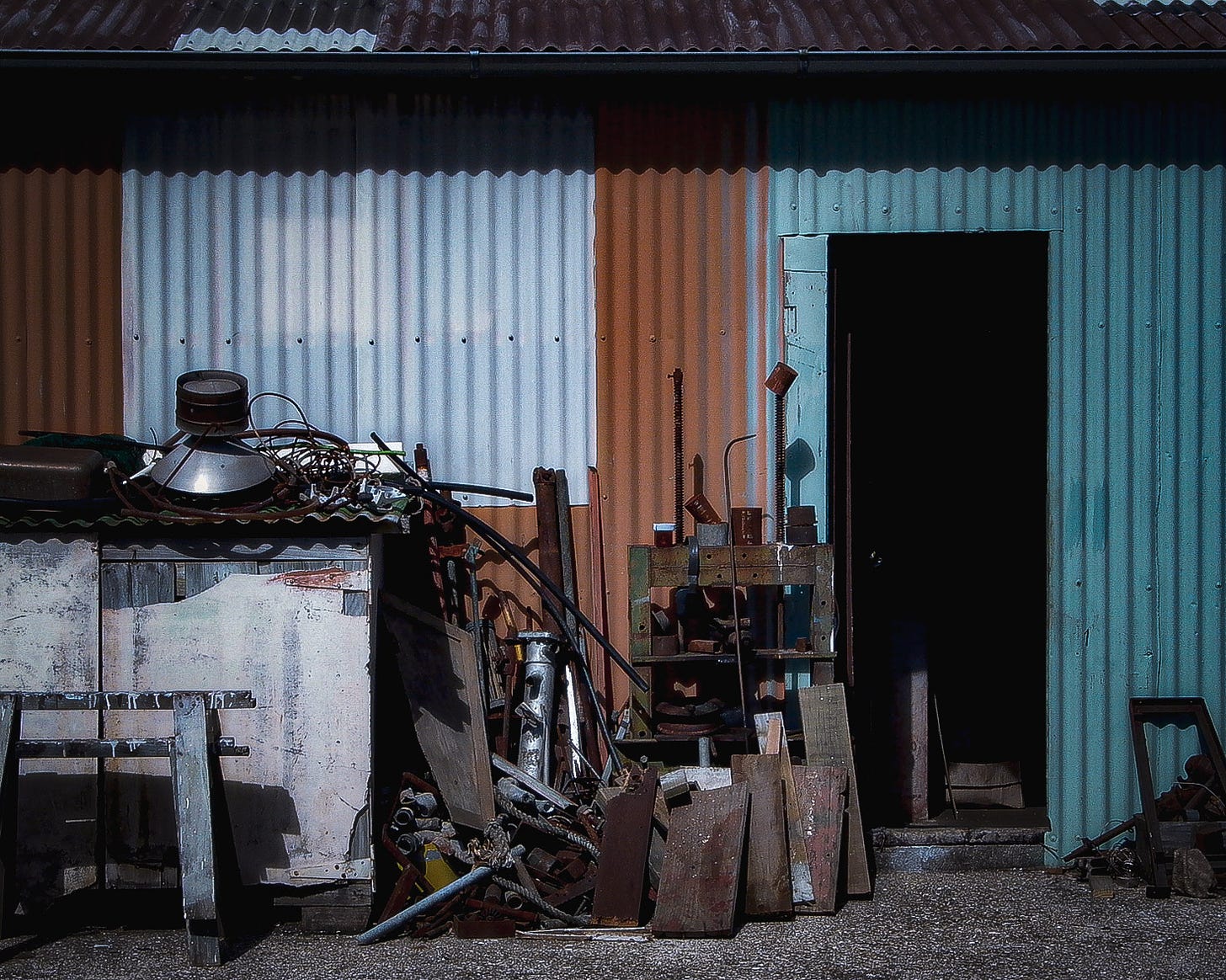He sucks the spines outta cows
How exploring an old family story left me teetering between different realties

A once thriving timber town, Utiku now sits in the middle of open pasture. The native bush that sustained a pioneer population has gone—as has the population that parasitised itself out of existence. The town where my maternal grandmother once lived with her parents and older brother has all but disappeared.
South of the desert road and one of the most starkly beautiful landscapes of New Zealand’s north island, Utiku used to stretch across both sides of the Hautapu Gorge. The two halves of the town were linked by a wood and steel suspension bridge known locally as the Black Bridge. Now, the east side of the gorge has been reclaimed by regrowth of bush and the only bridge across the gorge is a mile out of town.
It’s the remains of the Black Bridge that I’m here to see. That bridge is at the heart of one my core inherited memories.
Only a hundred yards from the state highway, the Black Bridge is hidden from those who haven’t been party to its gradual demise and don’t know to look. Other bridges of this type have been saved—marked, plaqued and photographed onto the tourist heritage route. This one, broken beyond repair, passes the notice of all but the couple who have long since abandoned attempts to farm the futile, heavily sloping, surrounding land. Now, they sit and, it seems, wait for time to pass while their home slowly returns to the earth.
I pull the rental car onto the banked side of the highway, avoiding the track that leads down to the house. Peering into the dense green, I see two figures soaking in the watery sunshine that falls against a broken house. The bridge is near invisible from the road, but I’m reluctant to intrude on these silent lives. Instead, I walk back uphill along the highway to try and gain a better view.
“Jump the fence if y’want.” A man’s voice drifts to me through the bush.
I hesitate and call out,
“But—there’s barbed wire.”
“You wanna see the bridge don’t ya?”
I resign my hope for quiet reflection and walk back the way I’ve come to the driveway proper and then down toward the house. The two figures watch me pick my way through ancient machinery, past a dust coated mongrel and make no attempt to move. The man’s wiry bare chest and sharp eyes give him the appearance of a terrier—healthy but worn. His wife smiles vacantly toward the sky, lost in her own reverie.
“You been here before? People don’t stop ‘les they know what they’re looking for.”
“I came this way with my mum a few years ago. Her mother used to live in Utiku. Her dad was the postmaster. We couldn’t get close enough to see though.”
As a postmaster, my great-grandfather travelled the length of New Zealand on various postings. At some time in the 1920s, when my grandmother was small, the family landed in Utiku.
I’d always imagined the bridge, when it was whole, as one of those you might see in an old Western; wooden slats linked by fraying rope that swings with increasing violence the more people it contains. It’s a mental image fed by the second-hand story I’ve been told many time. A story where my grandmother’s older brother used to race to the centre of the bridge and make it bounce while she, clinging to the rail, made her fearful way across. And the day that, after the children had completed their own playful crossing, a dray with two bullocks and driver reached the centre of the bridge, then plunged into the gorge as the bridge collapsed.
It’s a story that has been with me all my life. My grandmother was so traumatised by the event, she had nightmares for years afterwards.
I tell the man the outline of the story, as it’s been told to me. Hoping he might know more, that he might be able to confirm this story that has haunted three generations.
He man chews his lip and looks me up and down. Then he sticks out his hand, accepting my explanation and my presence.
“Geoff. This’s Marlene.” He nods sideways towards his wife.
Marlene gazes vacantly at the sky, her bare feet planted wide on the sandy soil. She makes a barely perceptible nod in recognition of the introduction but doesn’t speak.
“No one stops here any more. My son doesn’t even come back. He’s in Australia.”
And then—“So, you wanna see the bridge?”
Leaving Marlene in her silent examination of the clouds, he leads the way downhill across the neglected field.

The land adjacent to the gorge is heavily wooded and littered with the corpses of old machinery and vehicles rusted beyond repair. It slopes steeply and Geoff moves apace through this mechanical graveyard, skilfully avoiding the rusted sheet metal and barbed wire that thrust upwards through layers of new soil. I, less sure of the safe route alternate my careful observation between the ground, the slope and the approaching cliff.
The remains of the Black Bridge are skeletal. Twin concrete towers stand either side of the gorge with a single steel cable suspended between one distant pair. This cable holds fast to regular distribution of vertical ties, from each of which hangs a shattered length of timber. On our side of the gorge, Framed by the concrete towers, the deck, solid at ground level, peacefully disintegrates as it peters out over the gorge.
Geoff steps confidently onto the deck while I, white knuckled, cling to the edge of one of the towers, only half confident of its concrete solidity.
“See down there?” Geoff indicates a point near the bottom of the gorge. I nod.
“—that’s where we found old Dot Watson. She lived in Taihape and her family wanted to put her in a home. So she came out here and jumped from the middle. You’d think that’d be a good spot, eh. She missed the river though—wind caught’er—landed in that gully. Dad had t’get harness on her to get her out again.”
I blink, unsure of an appropriate response.
“See that strip over there—the flax?”
Geoff waits intently for my acknowledgment.
“That’s here we found Jim—don’t know why he jumped. Probably pissed. Must’ve gone from ‘round about where you’re standing now. My son got him out.
“He’s moved to Australia now—my son—got himself a good job.”
Pride spills from his toothy smile.
“He’s atta meat works. Sucks the spines outta cows. Good job, eh?”
The grin spreads as he registers my barely-disguised shock. But he hasn’t finished.
“That flat strip o’er there? That’s where we found Jo from the freezing works. They closed down in June and we found him in July.”
He pauses. Becomes wistful.
“Pigs, people, sheep. They all end up down here.”Geoff indicates the bottom of the gorge.
I venture one hand to the rail and peep over its edge, wondering how often the timbers break further.
“I dunno about that story about your grandmother though. The bridge collapsed in ’98.”
We’re joined by the short-legged mongrel who slowly picks his way across broken slats to sit at Geoff’s feet and gaze up at him adoringly. Geoff surveys the wagging animal whose bright eyes communicate nothing but joy.
“You’re the happiest dog in the world, eh? Daft as shit though.”
He looks toward me, and half closes his eyes, considering my tight grip on the railing.
“Best way to be happy that is—have no brain to think.”
I want to question Geoff further, but I don’t even know where to start. He knows as much as anyone is likely to know. His family has been here for generations. We pick our way back up the slope to the house where he tells me more of his own family history. He is rooted in this place, and I feel his simultaneous pride and sadness at his son’s choice to move away; his hope that one day he’ll come home.
I thank Geoff and the still silent Marlene and, as I work my way slowly back to the state highway, I realise, not for the first time, that these family stories never quite add up. My grandmother was a great storyteller, but her stories never matched other people’s reality. Hers is the kind of story I’d expect to leave some trace in local memory. But later, when I visit the local history section of the nearest library, I can find nothing. I ask the staff and they’re intrigued but can offer no further clues.
When I return to the story, sixteen years later, hopeful that a world of Google-ordered information will finally reveal at least one recorded memory of this incident, I find only a single three-minute drone video. I watch it hungrily, hopeful for any mention of the story.
And there it is. Overlaid on the video are the words “In the 1930s, a fully laden truck crashed through the wooden deck ending up in the Hautapu River below.”
For a moment I’m elated. Then I read the video description. “There is not a lot of ‘written’ history about this bridge. Information was given by local residents still living in the township of Utiku, passed down through generations.”
The date would be about right. But no one in Utiku knew the story before I visited. And I wonder, have I unwittingly contributed to my own circular reference? In search of confirmation that this wasn’t just another of my grandmother’s many flights of fancy, have I cemented an unsubstantiated story in local folklore?
In search of one truth, I’ve been reminded of another.
We are the stories we tell. My grandmother was a powerful force. However uncertain I am of the stories I’ve inherited from her via my mother, she still lives on in those stories. Even as those stories change in the telling and retelling, as long as they are told, she still has life.
If you’d like help to unearth your own memories, sign up for the first ever round of The Memory Mine.
The Memory Mine is a six-week programme that uses a guided journalling process to help you unearth your memories and create a bank of personal stories. Stories you can use in your own creative projects or to create a memory archive (a little piece of yourself) for your family and for the future.
Launching in a few weeks, the first round of the course will be available at a reduced rate and open to only a small number of people. This way, I can iron out the kinks and ensure everyone gets the support they need.
To get on the waitlist, and be notified as soon as this is open, click here.





And once again, an uncanny coincidence concerning our grandmothers telling stories of fancy tinged with truths and tales!!
Mine was French though and a large part of the reason I am here... I have the outline of a fictional novel based on my grandmothers story written, though it will take me years to finish I am determined to write it before I’m no linger capable.
This is beautifully written Miranda.. I can imagine every second of your encounter with these characters! X
I love that image, "sucks the spines out of cows"! And I wonder too about your grandmother. There must be some truth to her story, some seed that started that story rolling.